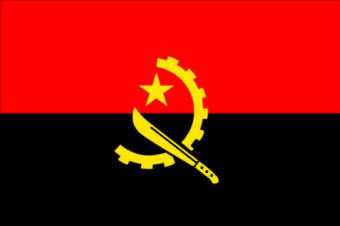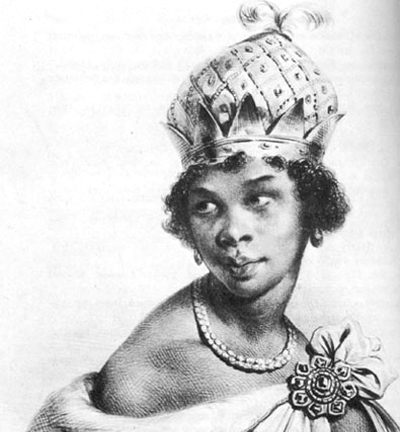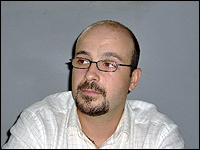AngoNabeiro / Cafe Delta / Cafe Ginga
Estrada do Cacuaco Km 5
PO Box 5727, Luanda
Email: anabeiro@snet.co.ao
Tel: +244 222 840161 / 62
How is the coffee? How well is it delivered?
My expectations for any coffee that is roasted in a hot and muggy coffee producing country and transported to the United States in luggage are generally pretty low. Opportunities for the coffee to be damaged by heat, humidity, and poor packaging are far too great. Upon receiving this kilogram of roasted whole bean coffee I politely thanked the gift bearer and placed any hope of this coffee stimulating my palate far from the reach of reality. A couple of days later, I used my 480-watt Baratza Virtuoso burr grinder to grind up a fine espresso sample of the beans for use in a Gaggia Classic modified machine with a Rancho Silvia wand. About 23 seconds later, a full Illy cup of syrupy espresso was ready to be slurped. My initial surprise was that the machine pulled the shot surprisingly well for a first try.
After sipping the shot I was surprised again with the freshness and fruitiness of the drink. The aroma of the beans was not nearly as satisfying as the drink itself. The quality of the beans themselves did leave a little to be desired. The roast was not consistent enough to be considered specialty quality – with some beans barely brown and others burnt to a crisp. Also, some were very small and damaged while others were huge. Furthermore, I found a piece of metal wire resting in between a few beans when I was pouring the bag into a storage container – reflecting less than ideal quality control standards by the processing company. The packaging for the beans is metalized with an additional layer of multicolored labeling and a valve application for allowing gases to escape after sealing – a high quality packing meant for beans that a company would expect to export and/or sell retail.
Again, the taste was exotic and I was encouraged enough to make an entire pot of drip coffee with the same beans. The end result was a bit less to my specific liking – I like a brighter coffee with a lighter roast and more mild finish. Although, on colder days I like a drip coffee with a bit more character in the body than my usual Central American and Colombian varieties. I’ve begun mixing some beans from Cundinamarca, Colombia with my Angolan coffee that apparently originates on an estate (fazenda) called Lobito (not to be confused with the port city of the same name) and am pleased to drink this blend in both espresso and drip coffee form.
What’s in a name? Ginga’s backstory
The Ginga (Njinga) name is distinctly Angolan, as it refers to a queen dating back to the times of the Ngondo Kingdom in Africa. The Ngondo Kingdom was originally a tributary kingdom of the Kingdom of Congo – existing before the Portuguese colonizers arrived in 1482. The Ngondo Kingdom was governed by Ginga’s father, Ngola Kiluange(Kiluanji), when the Portuguese arrived. He fiercely resisted the Portuguese as well as all other foreigners until his eventual decapitation. The Portuguese attributed the name Angola to the lands now known as Angola, not knowing/caring that the Ngola was the name of the ruler, not the lands.
Queen Ginga is a legendary figure in African history and the object of pride in Angola, as she is viewed as one of Angola’s most shrewd diplomats, rulers, military minds and intelligent leaders. So much is written on her that her entire history appears to be in dispute and includes elements of near-mythology – certainly originating from the 16th century equivalent of smear campaigns and propaganda. She is rumored to, at times, have adopted cannibalism, a very pious Catholic lifestyle, and – according to Maquis de Sade’s “Philosophy in the Bedroom” – she sacrificed elements of her all male harem of lovers immediately after lovemaking. In other words, there is much mystery and intrigue surrounding her life but she is most certainly a key historical figure in the Angolan national identity.
Throughout her political career, Queen Ginga both resisted and compromised with her Portuguese occupiers. There seems to have been a relative interdependency between Ginga and Portugal. She converted to Christianity, adopted tribal customs, and went to war with the crown and neighboring tribes – whatever ensured her survival. Perhaps this is why the brand name Ginga is appropriate for a coffee company that claims to be 100% Angolan, yet is very much entangled in a past connected to Portugal. Ginga is one of two coffee brands connected to a holding company called AngoNabeiro, the other being Delta Café (a widely known Portuguese brand). AngoNabeiro is part of a Portuguese conglomerate known as Nabeirogest, or more informally, Grupo Nabeiro. One of the strongest performing companies in this group is Café Delta. Café Delta dominates the coffee market in Portugal, is expanding rapidly in Angola and Brazil, and has long been active in segments of the East Asian market for roasted coffee (see Macau).
But, the Portuguese connection dates back to before Angolan Independence when AngoNabeiro was setting up coffee production operations in 1973 right before Portugal experienced a coup d’état in 1974 and, as part of a larger Portuguese agreement, Angola was liberated from colonization through the Alvor Agreement (Acordo do Alvor) in 1975. Between 1975 and 2002, Angola endured a violent civil war that ravaged the countryside and made sustaining its agricultural economy very unpredictable. As in nearly all civil conflicts, land/property rights were constantly challenged creating terrible instability for coffee farm owners.
During the earlier part of the difficult times in Angola, Rui Patricio oversaw daily operations and ownership of AngoNabeiro inside of Angola. Production continued, although at very small quantities, until 1983 when the company closed due to lacking technical assistance and know-how. The physical infrastructure where AngoNabeiro’s main facility was located was loosely protected, unproductively, until 1998 when Delta Café proposed a revitalization of its coffee production in Angola. By 2000, the Café Ginga brand emerged and by 2002 the civil war in Angola finally ended. Café Ginga and AngoNabeiro has grown steadily since, with an estimated US$1.2 million of annual revenues in 2005 according to Director General Rui Melo. Part of their growth has been thanks to a business structure where the mixed-capital Angolan company, AngoNabeiro benefits from Grupo Nabeiro’s know-how and financial largesse (capital and cash-on-hand). Café Delta is one of many companies housed within Grupo Nabeiro and it has been tremendously successful over the past decade. As Ginga changes outside perceptions of high quality coffee within the Angolan market their ambitions are set on carving out market share in nearby South Africa and other countries in their immediate vicinity.
Rui Melo interview on history of AngoNabeiro (Portuguese): http://www.winne.com/dninterview.php?intervid=1686
Mr. Rui Melo
Manager / Director General of AngoNabeiro






Thanks for the story. I also Ginga lover. I live in RSA and cannot buy this coffee there, though. I am buying it during my visits to Angola. Does anyone know are there any coffee plantations and production left around Porto-Amboim area? It used to be a large hub for the coffee export. But now the warehouses are empty and from the railroad just a monumet with the steam train was left. Alexander
LikeLike
me podrías decir que precio tiene el cafe Ginga es para una tarea
LikeLike
this cool to see,
my grandfather use to produce coffee in Gabela, Kwanza Sul
well done guys.
here in south africa we need some angola coffee
LikeLike